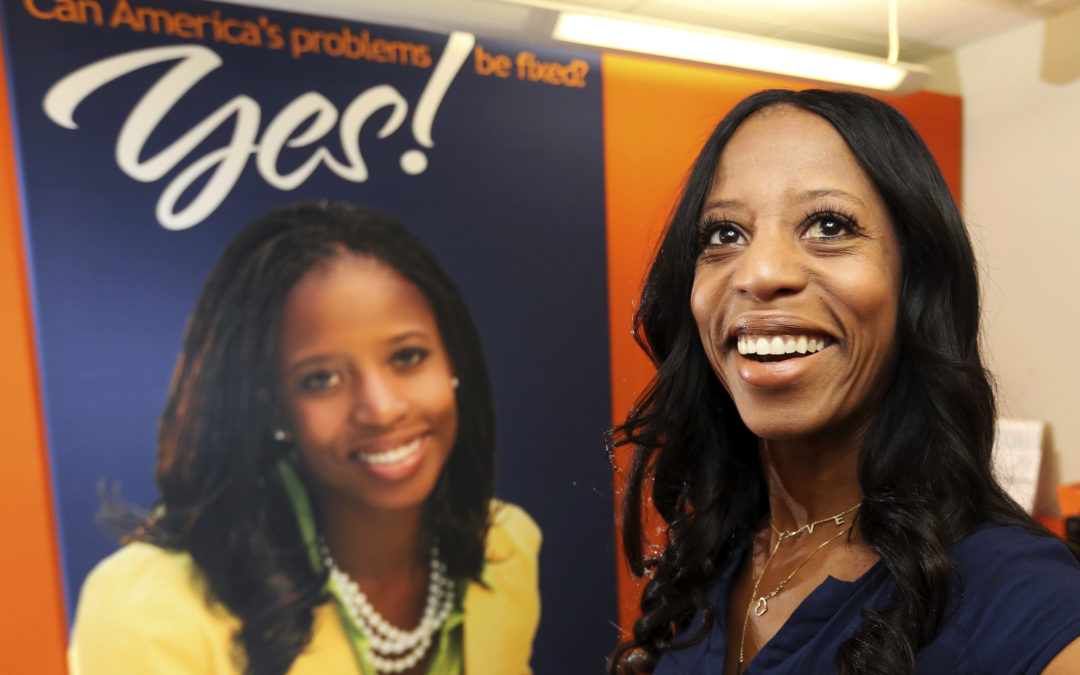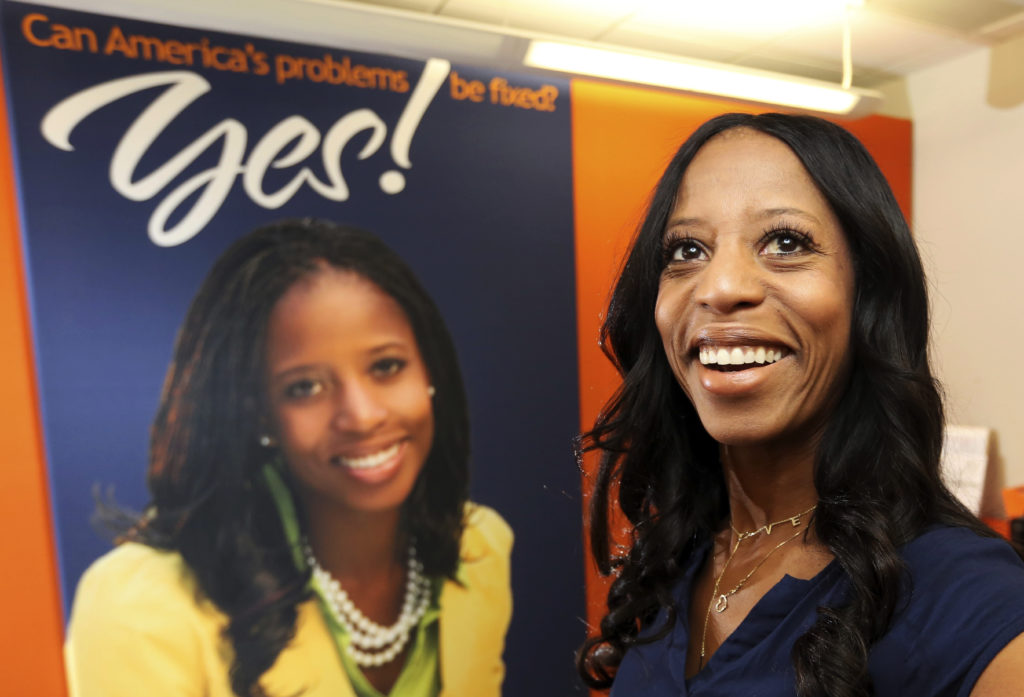
by Associated Press | Oct 18, 2018 | Headline News |

In this Sept. 17, 2018, photo, Republican U.S. Rep. Mia Love speaks during an interview in Murray, Utah. Love is battling Salt Lake County Mayor Ben McAdams for Utah’s 4th Congressional District. In conservative Utah, the first black female Republican in Congress is trying to fend off a strong challenge from a well-known Democratic mayor in a largely suburban district where many are wary of President Donald Trump. (AP Photo/Rick Bowmer)
The first black female Republican in Congress is facing a tough challenge from a well-known Democratic mayor in a largely suburban Utah district where many say they are wary of President Donald Trump.
U.S. Rep. Mia Love has sought to create some distance from the president while challenger Ben McAdams criticizes her record and pitches himself as a moderate.
The tight race also has a potential down-ballot wild card: A hotly contested medical-marijuana proposal that could bring out new voters.
Love, considered a rising star in the GOP, is fighting to keep her seat in a race targeted by national Democrats hoping to regain control of the House. She contends that she stands up to Trump on issues like immigration and trade.
“I wasn’t sent to Washington to walk in lockstep behind the president, or just be there and fight everything,” she said in an interview with The Associated Press, pointing to the federal tax overhaul as a GOP accomplishment.
McAdams, meanwhile, is seeking to burnish his image as a family man planted firmly on the political middle ground who would not support California Rep. Nancy Pelosi as House Speaker if the Democrats gain control. “I don’t like President Trump, but that’s not going to stop me from working with him,” he told The AP.
In another year, a Democrat would have little chance of making serious headway against a GOP incumbent in a Utah district where Republicans hold a 3-to-1 registration margin.
This year, it’s a dead heat.
Utah voters, though generally conservative, have long been wary of Trump’s brash style and comments about women and immigrants. While Republican politicians elsewhere have fallen after running afoul of the president, Utah GOP voters picked onetime critic Mitt Romney as Senate nominee in a landslide.
Love’s district includes suburbs of blue Salt Lake City, where anti-Trump sentiment runs particularly high.
Aaron Wood of Orem, who works with people with disabilities and is concerned about possible cuts to programs like Social Security, said he’s leaning toward voting for McAdams because he feels like Love is too closely aligned with Trump.
“It’s a problem and not a good direction for Utah,” he said.
The candidates exchanged sharp words during a debate on Monday, with McAdams accusing Love of supporting cuts to Social Security and environmental regulations while failing to be available at town halls.
“I feel like you’ve changed, honestly, you went to Washington and you’ve changed,” he said.
Love says he is distorting her record. She said she supports reforms to Social Security for younger people as well as compromise environmental legislation and is available to voters in small groups or telephone town halls.
“We have to let people know honesty still means something, integrity still means something,” she said.
The race could be affected by factors that have little to do directly with either candidate.
Voters will also be deciding on a medical-marijuana ballot proposal opposed by the highly influential Mormon church. The faith now backs a compromise to legalize it with strict regulations.
The issue could bring more people to the polls, said Damon Cann, a political scientist at Utah State University. New voters can register on Election Day for the first time this year.
McAdams says he’ll vote for the medical marijuana ballot proposal, while Love said she supports the compromise but wouldn’t say if she’ll vote for it.
While that issue could be a bump for McAdams, the ballot also holds a potential lift for Love with Romney’s high-profile Senate run. The record there is mixed, though: His presidential candidacy didn’t lift her to victory over a well-known Democrat in 2012.
Love, a daughter of Haitian immigrants, became the country’s first black female Republican in the U.S. House in 2014. She was clear when asked whether her race runs counter to a national narrative about more minority women running for office, mostly Democrats: “Diversity is great for them until you actually have an independent thought.”
McAdams’ six years as mayor included going undercover as a homeless person pushing back against a tax breaks for a once-planned Facebook data center.
by Christine A. Scheller | Aug 31, 2012 | Feature, Headline News |

IN LIVING COLOR: Republican congressional candidate and Saratoga Spring, Utah, mayor Mia Love addressed the second session of the Republican National Convention on Tuesday night in Tampa, Florida. She was among several leaders of color to take the stage. (Photo: Mike Segar/Newscom)
The stage of the Republican National Convention that concluded in Tampa last night was a lot more colorful than the floor, at least when it came to skin color (and Clint Eastwood’s odd performance). With speeches by African Americans, Indian Americans, and Hispanic Americans, one might have thought the GOP was the party of color. But, Baratunde Thurston, author of How to Be Black, was in Tampa reporting for WNYC and Yahoo News, and decided to count how many black people were actually in attendance. He curated his count under the Twitter hastag #negrospotting. (That apparently got conservative fire-brand Michelle Malkin fired up.) His last count, reported this morning, was 238 African Americans among the 5,000+ attendees.
Condoleezza Rice
The high point among speakers of color, at least according to an unscientific survey of my journalist-heavy Twitter feed, was former Secretary of State Condoleezza Rice, who gave a hard-hitting foreign policy speech Wednesday night. Even those who didn’t care for the substance of Rice’s speech conceded that her delivery was impressive, perhaps even presidential. “When the world looks to America, they look to us because we are the most successful political and economic experiment in human history. That is the true basis of ‘American Exceptionalism,'” said Rice. “The essence of America — that which really unites us — is not ethnicity, or nationality or religion — it is an idea — and what an idea it is: That you can come from humble circumstances and do great things.”
Artur Davis
Former Democratic Representative from Alabama Artur Davis said we should have known better than to have been seduced by the hype surrounding Barack Obama back in 2008. “Do you know why so many of us believed?” said the former Obama supporter. “We led with our hearts and our dreams that we could be more inclusive than America had ever been, and no candidate had ever spoken so beautifully. But dreams meet daybreak: the jobless know what I mean, so do the families who wonder how this Administration could wreck a recovery for three years and counting. So many of those high-flown words have faded.”
Jeb Bush
Jeb Bush, the one-time Florida Governor whose wife is Mexican American, defended his brother George W. Bush’s record and talked passionately about educating children of color. “We need to set high standards for students and teachers and provide students and their parents the choices they deserve. The first step is a simple one. We must stop pre-judging children based on their race, ethnicity or household income,” said Bush. He then highlighted what he said are Florida’s achievements in improving academic performance, particularly for students of color. “Here in Florida in 1999, we were at the bottom of the nation in education. For the last decade, this state has been on a path of reform,” he said. Among African-American students, Florida is ranked fourth in the nation for academic improvement, among low-income students, the state is third, among students with disabilities, it is first, and, among Latino students, “the gains were so big, they required a new metric,” Bush said.
Susana Martinez
New Mexico Governor and former Democrat Susana Martinez delivered a rousing speech noting her own ethnic “first.” “As the first Hispanic female governor in history, little girls often come up to me in the grocery store or the mall. They look and point, and when they get the courage, they ask ‘Are you Susana?’ and they run up and give me a hug,” said Martinez. “It’s in moments like these when I’m reminded that we each pave a path. And for me, it’s about paving a path for those little girls to follow. No more barriers.”
Mia Love
Up-and-coming U.S. Congressional candidate and mayor of Saratoga Springs, Utah, Mia Love called President Obama’s version of America “a divided one — pitting us against each other based on our income level, gender, and social status.” She said the story of the American Dream is one “of human struggle” that has “been told for over 200 years with small steps and giant leaps; from a woman on a bus to a man with a dream; and the bravery of the greatest generation, to the entrepreneurs of today.” Love, like Mitt Romney, is also a Mormon.
Nikki Haley
South Carolina Governor Nikki Haley defended her state’s controversial immigration law, calling it “innovative.” Said Haley, “We said in South Carolina that if you have to show a picture ID to buy Sudafed and you have to show a picture ID to set foot on an airplane, then you should have to show a picture ID to protect one of the most valuable, most central, most sacred rights we are blessed with in America — the right to vote. And what happened? President Obama stopped us.”
Throwing Peanuts and Racial Slurs
On the convention floor, meanwhile, a couple delegates made headlines for throwing peanuts at a black CNN camerawoman and saying, “This is what we feed animals.” Patricia Carroll, the camerawoman, was reticent about the incident, telling Journal-isms it could have happened anywhere, including the Democratic convention, but she was not surprised it happened in Tampa. “This is Florida, and I’m from the Deep South,” she said. “You come to places like this, you can count the black people on your hand. They see us doing things they don’t think I should do.”
BeBe Winans’s “Bipartisan” Gospel Moment
Even PBS’s news anchors seemed to enjoy gospel singer BeBe Winans’s stirring rendition of “America, America.” Winans, who performed on the final night, told Essence magazine that he saw his reportedly unpaid participation in the convention as a display of bipartisanship. He was not unaware of how controversial it would be for him to sing there, he said. “The RNC realized this was something that could work to their advantage and I realized there is a master plan here,” remarked Winans. “And so my message to them and to the world is that we are all Americans before we are a part of any political party. It’s so simple and yet we make it so difficult.”
True. But, of course, by definition political conventions are neither the time nor place for bipartisanship. Rather, they are an occasion for creating a narrative for what each party believes America should truly be. And this party clearly wanted to be perceived as embracing a multi-racial future. The questions is: were voters convinced?
The Nominees
Oh, and in case you were wondering, former Massachusetts Governor Mitt Romney accepted the Republican nomination for president and Wisconsin Congressman Paul Ryan agreed to be his VP, if the people so choose.
Update 9/2: Baratunde Thurston clarified his post: “The final final count is in, and I spotted 238 Negroes during the RNC, 239 if I count seeing my own reflection in various mirrors and windows. I estimated no more than 60 of those to be authenticated GOP delegates or party members. It turns out the actual number of black delegates was 46.”
What do you think?
What were the high and low points of the GOP Convention?



